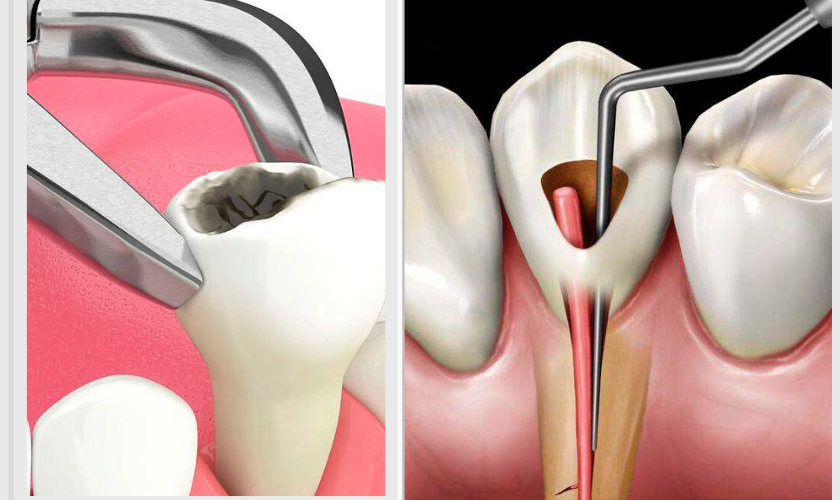
Tooth sensitivity can be a common yet uncomfortable problem for many people. When you experience sharp pain or discomfort while eating hot, cold, sweet, or even acidic foods, it’s often a sign that something is wrong with your teeth. But how can you tell if that sensitivity is severe enough to require a root canal?
In this blog, we’ll explore when a root canal treatment might be necessary for sensitive teeth, how it works, and what to expect if you need the procedure.
What Causes Tooth Sensitivity?
Tooth sensitivity occurs when the protective layers of your teeth—enamel and dentin—are compromised. Here are a few common causes:
- Worn enamel: Years of brushing too hard, consuming acidic foods, or grinding your teeth can wear away the enamel.
- Gum recession: When gums recede, they expose the root of the tooth, which has nerve endings that can become highly sensitive.
- Tooth decay: Cavities that haven’t been treated may reach the nerve, causing severe sensitivity.
- Cracked or chipped teeth: These can expose the nerves, leading to discomfort.
- Old dental work: Fillings or deteriorating crowns can cause the tooth to become sensitive.
- Recent dental procedures: Sometimes, recent dental work like fillings or cleanings can leave teeth temporarily sensitive.
When Is Root Canal Treatment Necessary?
Not every case of sensitive teeth requires root canal therapy. In fact, many forms of tooth sensitivity can be addressed through less invasive treatments like desensitizing toothpaste or dental bonding. However, in some cases, root canal treatment becomes essential. Here are the situations where a root canal might be the next step:
1. Prolonged Sensitivity To Hot and Cold
If your tooth sensitivity persists long after you’ve consumed something hot or cold, this may be a sign of a more severe issue. When the tooth’s nerve is exposed or inflamed, it can react painfully to temperature changes. In these cases, a root canal can remove the inflamed or infected pulp and relieve discomfort.
2. Sharp & Intense Pain
Sharp pain that strikes without any apparent cause—especially when biting or chewing—could indicate that the tooth’s nerve is severely damaged or infected. If the pain continues even after you’ve removed the stimulus (such as hot or cold foods), this could point to a deep infection in the tooth’s pulp, making root canal treatment necessary.
3. Tooth Discoloration
While a yellowish tint often suggests tooth staining, a tooth that turns grey or black may indicate pulp damage. In these cases, the tooth nerve may be dying, which calls for immediate root canal therapy to prevent infection from spreading to surrounding tissues.
4. Swollen Gums or Abscess
A swollen area or abscess near the sensitive tooth indicates that the infection has spread. Abscesses are pockets of pus that develop due to bacterial infection and can lead to severe pain, swelling, and even fever. At this point, a root canal is needed to clean out the infection and restore the tooth.
5. Chronic Throbbing Pain
Constant throbbing pain in your tooth or surrounding area that doesn’t go away with over-the-counter pain relievers often indicates advanced pulp damage or infection. In this scenario, root canal treatment can alleviate the pain and save the tooth from extraction.
How Does Root Canal Treatment Work?
If your dentist recommends root canal treatment for your sensitive tooth, you might wonder how the procedure works. Here’s a step-by-step guide:
1. Examination and Diagnosis
The dentist will examine your tooth using X-rays to assess the extent of the damage and whether a root canal is necessary.
2. Local Anesthesia
To ensure your comfort, the dentist will administer local anesthesia to numb the tooth and surrounding area before the procedure begins.
3. Accessing The Pulp
A small opening is made in the tooth’s crown, allowing access to the pulp chamber.
4. Removing the Damaged Pulp
The infected or inflamed pulp is carefully removed from the pulp chamber and root canals.
5. Cleaning and Disinfecting
Once the pulp is removed, the inside of the tooth is cleaned and disinfected to remove bacteria and prevent further infection.
6. Filling The Canals
The cleaned root canals are then filled with a biocompatible material known as gutta-percha, which seals the space.
7. Sealing The Tooth
Finally, the dentist will seal the opening in the tooth, and in many cases, a crown is placed over the tooth to protect it from future damage.
Benefits of Root Canal Treatment for Sensitive Teeth

Root canal therapy offers several benefits for patients suffering from severe tooth sensitivity:
- Pain relief: The procedure eliminates the source of pain by removing the infected or damaged pulp.
- Tooth preservation: A root canal saves the tooth from extraction, allowing you to maintain your natural smile.
- Prevents infection spread: Root canal treatment removes the infection and prevents it from spreading to surrounding tissues or even other teeth.
- Long-term results: When properly cared for, a tooth that has undergone root canal therapy can last a lifetime.
How To Prevent Tooth Sensitivity In the Future?
Preventing tooth sensitivity and avoiding the need for future root canals involves good oral care habits and lifestyle adjustments. Here are a few preventive tips:
- Use a soft-bristled toothbrush to avoid damaging enamel.
- Brush gently in a circular motion.
- Avoid acidic foods and beverages that can wear down enamel.
- Use desensitizing toothpaste if you have mild sensitivity.
- Visit your dentist regularly for check-ups and cleanings.
- Consider wearing a night guard if you grind your teeth at night.
Root canal treatment can be necessary for sensitive teeth when the pulp becomes infected or damaged, especially in cases of prolonged pain, discoloration, and swelling. While tooth sensitivity doesn’t always lead to a root canal, it’s important to consult your dentist when symptoms worsen or persist.
Through early intervention, less invasive treatments may be an option, but if a root canal is needed, the procedure is highly effective at saving your tooth and relieving discomfort. Incorporating good oral hygiene habits and visiting your dentist regularly will help prevent sensitivity and ensure your teeth remain healthy for years.


